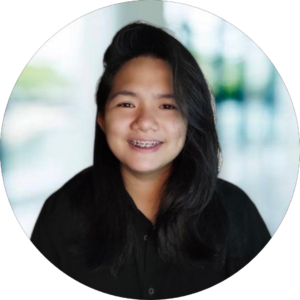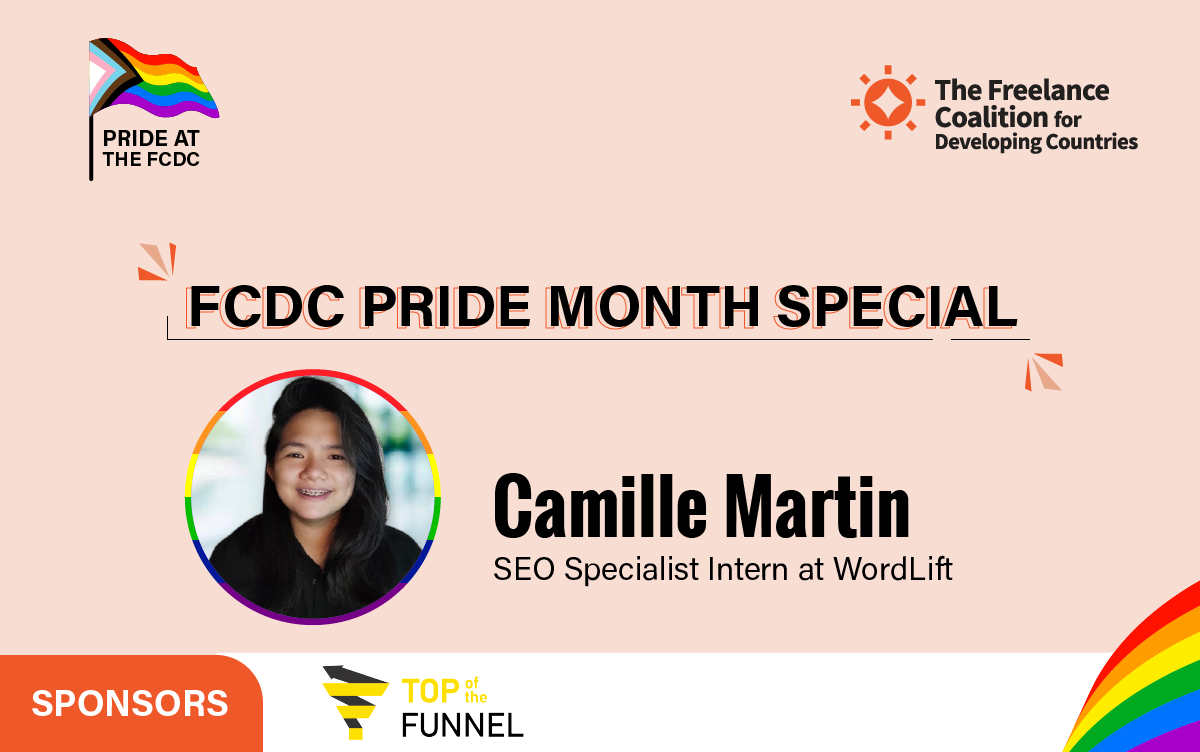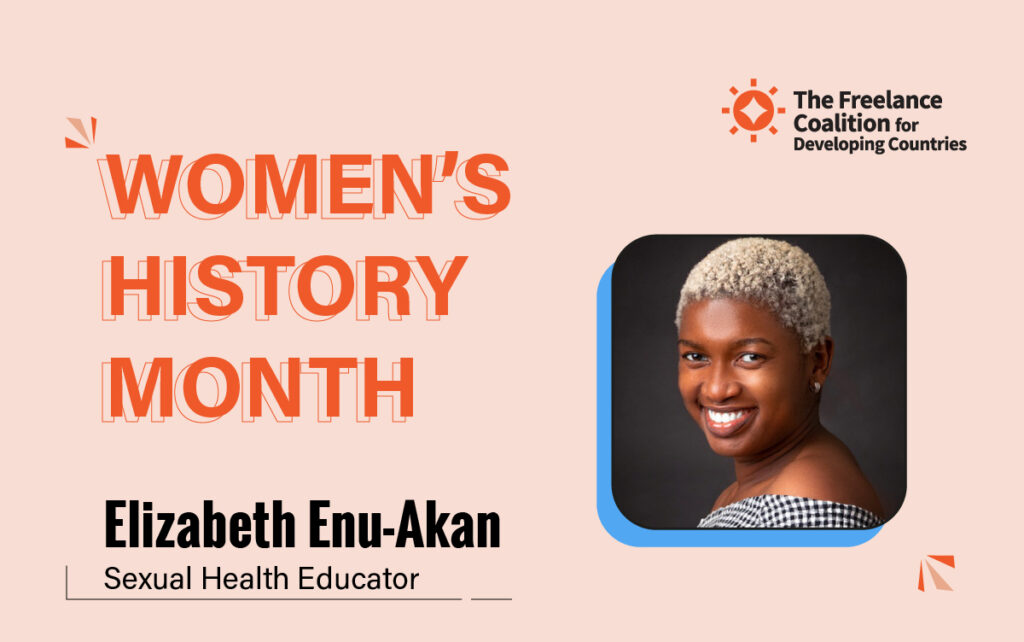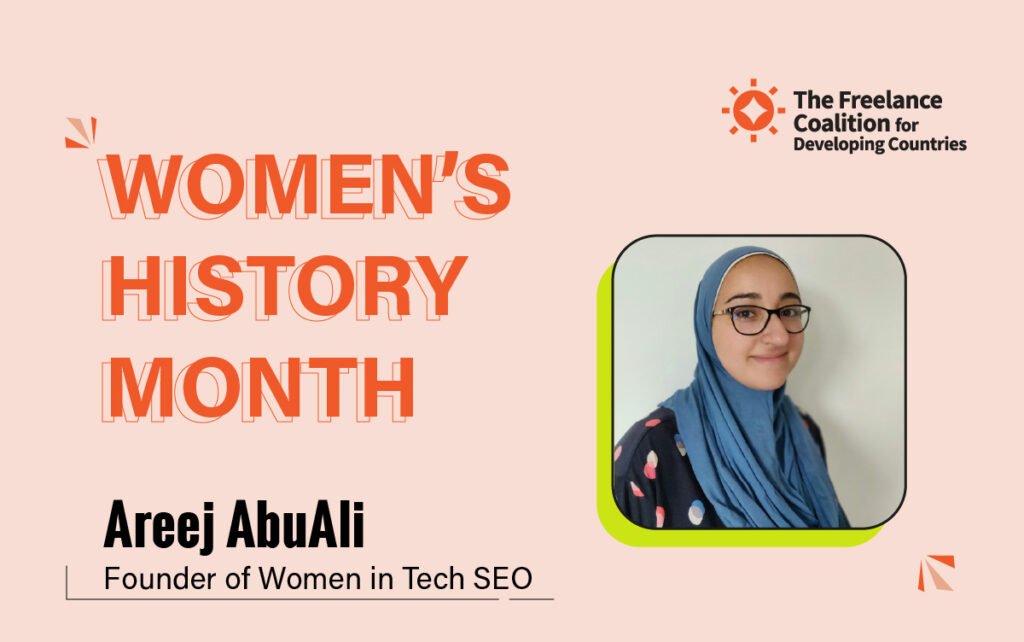Episode Summary
Happy Pride Month!
Throughout this month, the FCDC is excited to shine a spotlight on our incredible queer members, as we delve into their inspiring journeys of self-acceptance.
In this episode, we spoke to tech SEO Specialist about her personal journey and experiences. While the LGBTQ+ community in the Philippines is becoming more accepted and open, there is still progress to be made and she shares this with us.
**Huge thank you to the awesome folks at Top of the Funnel for sponsoring this episode and making the FCDC pride month specials possible!**
Join Top Of The Funnel for FREE and get actionable tips, strategies, and opportunities from world-class content marketers!
Guest Profile






Key Insights.
💡Personal Journey and Acceptance.
Camille shares her personal journey as a queer woman in the Philippines. She talks about growing up in a Catholic family and feeling pressure to conform to societal expectations. However, having a lesbian sister helped her recognize her own feelings, although she initially resisted accepting her identity.
It wasn’t until she started working with diverse and open-minded people that she felt encouraged to be honest with herself. Camille emphasizes the importance of self-acceptance and being true to oneself.
💡Progress and Acceptance in the Philippines.
Camille discusses the progress of LGBT rights and acceptance in the Philippines. She mentions that the LGBTQ+ community is becoming more visible, with many influencers and organizations actively advocating for their rights.
Camille also notes that acceptance is not limited to younger generations but also includes older adults and families who have become more open and understanding. However, she acknowledges that there are still areas in the country where acceptance is limited and more work is needed.
Episode Highlights.
Shifting Attitudes and Influences
Camille attributes the shift in attitudes towards the LGBTQ+ community in the Philippines to various factors, including the influence of social media and the visibility of LGBTQ+ influencers.
She suggests that older generations are becoming more accepting as they engage with social media and become exposed to different perspectives. However, she acknowledges that there are regional differences in acceptance, with larger cities being more progressive compared to smaller towns and provinces.
Advice for Coming Out.
Camille provides advice for individuals who are contemplating coming out. She emphasizes the significance of self-acceptance as the first step and encourages people to take their time and find support from trusted friends or support groups.
Camille shares her own experience of initially fearing rejection but finding courage once she accepted herself. She highlights the importance of seeking a support system and finding resources online to help navigate the coming-out process.
Connect with Camille
Episode Transcriptions
Chima Mmeje 0:02
So we are with our third guest for pride moments. Come you Martin. Alright Camille, in order not to give you any labels, how do you identify and what are your preferred pronouns?
camille martin 0:19
And just come here but more into like, yes.
Chima Mmeje 0:24
Okay, you bisexual and pronouns are you? She Her, they them. What are your pronouns?
camille martin 0:30
It’s okay for me For She.
Chima Mmeje 0:33
Okay, okay, cool, cool, cool. All right now we’re getting into the nitty gritty procedures we don’t like to beat around the bush like, like, just Alright, so can you share your experiences as a queer woman in the Philippines?
And how was your identity shaped your personal journey?
camille martin 0:52
Absolutely. In the Philippines before it’s not yet that open is this this this is now that’s the perfect time that the people are every the UK is very open now. But before I was raised in a Catholic family also, in a growing up, it was also the end of this. So during that time, there was some kind of pressure that in to follow this path first before putting up my decisions, my choices.
But during those time, it was my sister is actually a lesbian. And so she leaves out. Oh, wow. But yeah, yes. But for me, I don’t know why. I don’t know. I think it’s because I’m the eldest that I am a hold on that feeling that it’s not just it’s just infatuation that I like this person is. That’s the feeling. I didn’t accept it for at that time when he was in high school.
And in college, actually, my friends is pushing me or asking me what do you like girls? or Do you like something or other things? I’d intentionally say I’m just a boyish type, but I don’t, I am more focused on the work and then studies that time, so I didn’t actually discover myself during the college days and just work in studies. I’m very focused that time and did not, but I really did wish that I pursue or discovering myself that time.
But yeah, I just discovered myself or I just become open to myself after I work. So working with diverse people, and very free people are very open, they know what they want. And then just a one one of my superiors just open me just be honest with me, what do you want?
And so I can know how to, to be terms with you and how, you know, how can I make just jokes with you so so that I become open so I like this person. And then he told me that it’s okay.
You can be accepted and it’s okay if if anything, didn’t work with that, first of all, and just be yourself is the most important thing that you can give to yourself. So that’s when the time that I open up with my family like my friend, so let’s just go with the flow. Everyone knows.
Chima Mmeje 3:24
That’s amazing. Family. That’s amazing. That’s amazing. All right. So you just said something that this is like the best time to be quiet in the Philippines.
I want to dig into that. What progress has there been in the Philippines around LGBT rights and accepted and at the areas that still need more work?
camille martin 3:49
Yes, for the last there’s still more work but for the community itself. There are some many influencers many personnels and we also have read my every year community doing that activity so it’s very very open now.
And I think some of the people also adult people accept us also very open now it’s not just a person that you can talk about this in our table they can be open now in that I think there is a family that friend family that I got into the dinner and then they accept it fully.
So I think there’s no no this that I mean family discouragement that they feel in the moment. You haven’t experienced here anything
Chima Mmeje 4:38
yet. Okay, so in terms of what what could be better right now, what could work better in the Philippines around LGBT Qi right right now What could they be doing better?
camille martin 4:49
The support the community as well. So the advocacy is different if you want to follow different personnels and just be in the out in the community. and follow the communities or communities if you are in
Chima Mmeje 5:05
like the government’s what kind of the Philippines Yeah, do to to improve life to your LGBT rights? What can what should they be doing?
camille martin 5:15
Um, actually, for their laws that haven’t approved yet, but for the then some of the the private commercials have third for or any they accept but for the law of it I go differ with the laws in here in the Philippines regarding that topic.
Chima Mmeje 5:42
Okay. So then the laws around LGBT rights could be better could be. I know that I know that’s gay marriage is not legal there. Yeah. I don’t think there’s any protection for queer people in the workplace either.
So those could be like some areas at least more protection for LGBT people. criminalising rise in hate crime and things like that. So definitely, definitely done. Yeah.
camille martin 6:06
Yeah.
Chima Mmeje 6:07
So I was going to ask how, how you finally accepted the body ready answer that. And you said, in the community, in family in walk, you’ve been accepted? I think that’s very interesting.
Because when you look at most developing countries, we tend to let me use the phrase, the phrase carry homophobia on our head, like a crown, like this kind of religious people tend to do that gun that just passed a bill.
Now, that sentence is called people to death. So it’s very interesting to see that in most of Asia, they’re going in a different direction. It they’re, they’re getting more acceptance. You talked about adults, not just our generation, not just Gen Z, not just millennials. Yes, the boomers all of them also diverse, more certain.
Yes. I’m just trying to understand, like, where did this shift happen? Like, when did this happen? Because growing up, this is not how the Philippines was represented. So it’s amazing to like, hear what is happening right now.
Like, where do you think the shift happened? Who were the people who were out there doing the walk? Tell me about the background of the square movement in the Philippines that has led to this acceptance right now.
camille martin 7:24
I think it’s the social media that he was accepting and some of the influencers, that giving back also to the community, and they show very good people. Like, they’re also permissions like that, that they accept.
So I think those boomers are the people that are older than us, except for us, because they are finding it out also in the social media that they know that I think they’re, they’re checking what are the people also say that they, you know, they’re very informative in terms, but I think it’s also on my side or in the environment that I have.
But I also feel that there is still more need or more communities or more places in the Philippines that don’t accept it. But that’s what I have in the environment, near and near me. And I’m near in the city of the Philippines. So I don’t know yet in the province or in the
Chima Mmeje 8:23
so I always like it myself. And then when you go to smaller towns, so that trucks that definitely tracks. Alright, so now you you do your internship right now? Which, yes.
How has your experience been with them versus working with companies locally in the Philippines? What’s the difference in experience?
camille martin 8:49
Yes, it is very difficult. It’s very different, very, very active, and they’re sharing their experiences per location, we have different. Andrea say that, why are you wearing some jacket, it’s really hot in our place. In one of our colleagues, it’s very cool.
And so it’s very cool that they accept every people in every community or in every country, and then they’re very helpful. They assist me in so much in just presenting the work and how the workflows in the corporate scene or international corporates, they’re very helpful.
Chima Mmeje 9:29
That’s amazing. That’s amazing. All right. This one is a bit tricky, but give it a chance. In your opinion, what are the biggest misconceptions or stereotypes that people have about queer woman? What are the biggest misconceptions about queer people in the Philippines?
That is one of the biggest assumptions quite like okay, for example, in black culture. Now, they might say, Everyone who has dreadlocks is gay. Do you understand like this kind of misconceptions? Maybe she dresses a certain way that makes her gay?
Do you have any kind of like this kind of cultural analysis, anything that someone does and they say, Oh, she’s doing like that, then that person is definitely gay. Again, it’s like misconceptions leaders in the Philippines.
camille martin 10:16
Yeah, she has we have for you got your hair short, very short or bulk type that are there for the day. And then when you have different colours of hair.
Yeah, sometimes it feels like, Oh, I know that, that first I didn’t have something that they feel the colour of the hair. It’s the first thing that you see.
Chima Mmeje 10:43
It just sounds so funny. That is so funny. All right. So I did any. Let me say let me use the word advocates, your organisations in the Philippines that are actively doing the work to improve LGBT rights that you would like to spotlight?
Any organisations in the Philippines that are like doing great work around helping LGBT people?
camille martin 11:13
Again, did I just know some personalities? Okay, but
Chima Mmeje 11:18
what are the names like something?
camille martin 11:21
It’s rohan and tina, they are a couple. And then yes, they are pushing some laws in the Philippines and then more or less with us need those influencers are really pushing and then they’re pushing.
They’re promoting the pride month this coming month or this next month? And then yeah, that’s all day eight, be very focused. Or work towards that.
Chima Mmeje 11:50
You work as an excuse comm you stop using work as an excuse to work is not everything there is that you want. There’s more to life than work. So as an excuse,
camille martin 12:00
I study first but yeah, it’s fine. It’s fine.
Move on to learning also to learn also to participate in that because if it’s going to happen it I haven’t experienced the bread March here in the Philippines, and just seeing them but I would go with them. Actually in a what do I want to experience yet this year?
Chima Mmeje 12:24
Right. Yeah, yeah. See, that’s something to do. It’s not. I think we need to find the excuses that we keep giving ourselves not to experience and leave. And then we just move those excuses so that we can live fully and as authentically as possible. Alright, so.
Right. I watch a lot of Philippine cookware contents. There is a lot of great content on YouTube and things like that. I don’t know if you watch them too. Which ones have been your favourite that you really enjoyed? Do you watch any of those like questions? Quite issues?
camille martin 12:59
No, no? No. Oh, my God.
Chima Mmeje 13:07
What kind of gay woman are you? If you don’t watch queer content, like a word of bisexual or you hear what she contains on YouTube? Like this event shows? Okay, okay, that’s fine. That’s fine. That’s fine.
My last question, what advice would you give to someone who is thinking of coming out? And they’re scared of how everyone is going to accept them? So what advice would you give to someone who is thinking about coming out of the closet?
camille martin 13:35
First, if it’s worth just talking to yourself and accepting what you’re you want, you just come up with your senses what they want. But then then just first accepting yourself. Even though that you haven’t have the courage to talk about it into other person. That’s the first step then next, you can talk to someone, be your friend, your closest friend, and just step by step you can do it.
I think that’s also happened to me that I have the fear of not failing, or they can accept me fully. But even though that I accept that I see I think, Ah, I have a feeling that this is not my personality. B.
So when the time came that I accept it fully in myself and accept myself already. I started to talk to people and then to find it. And then to the the internet official or my my support group, I support Ray want to support that. Yes.
Chima Mmeje 14:33
That’s amazing. That’s amazing. Camille thank you so much for your time. Thank you for doing this. And Happy Pride Month.
Camille martin 14:40
Happy Pride Month, everyone.

Jadesola Kareem
Passionate about content and diversity, Jadesola is a content writer. In her free time, with a cup of coffee in hand, she binges on reality shows.
- Jadesola Kareemhttps://freelancecoalition.org/author/jadesola24/
- Jadesola Kareemhttps://freelancecoalition.org/author/jadesola24/
- Jadesola Kareemhttps://freelancecoalition.org/author/jadesola24/
- Jadesola Kareemhttps://freelancecoalition.org/author/jadesola24/





